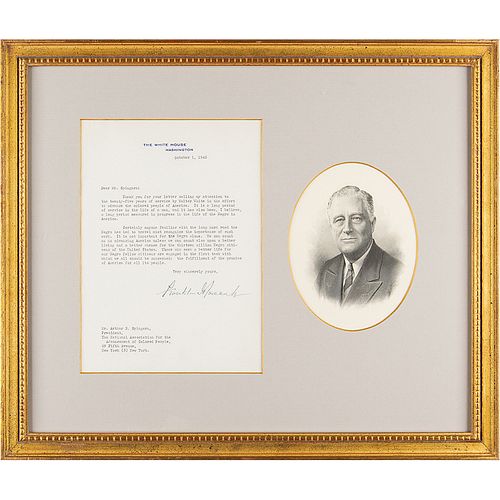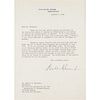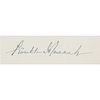Franklin D. Roosevelt Typed Letter Signed as President
Two ways to bid:
- Leave a max absentee bid and the platform will bid on your behalf up to your maximum bid during the live auction.
- Bid live during the auction and your bids will be submitted real-time to the auctioneer.
Bid Increments
| Price | Bid Increment |
|---|---|
| $0 | $5 |
| $50 | $10 |
| $200 | $25 |
| $500 | $50 |
About Auction
Jun 23, 2022
RR Auction support@rrauction.com
- Lot Description
TLS as president, one page, 7 x 9.75, White House letterhead, October 1, 1943. Letter to Arthur B. Spingarn, president of the New York chapter of the National Association for the Advancement of Colored People (NAACP), in full: "Thank you for your letter calling my attention to the twenty-five years of service by Walter White in the effort to advance the colored people of America. It is a long period of service in the life of a man, and it has also been, I believe, a long period measured in progress in the life of the Negro in America. Certainly anyone familiar with the long hard road the Negro has had to travel must recognize the importance of such work. It is not important for the Negro alone. We can count on no advancing America unless we can count also upon a better living and a better chance for the thirteen million Negro citizens of the United States. Those who seek a better life for our Negro fellow citizens are engaged in the first task with which we all should be concerned: the fulfillment of the promise of America for all its people." Handsomely matted and framed with an engraved portrait of FDR to an overall size of 19.25 x 16.25. In fine condition.
On May 25, 1944, President Roosevelt wrote a testimonial letter on behalf of Walter White and his twenty-five years of service to the NAACP: ‘He is small, dapper, high-strung, and it is only through his own insistence on his Negro blood (estimated to be about one-sixty-fourth) that anyone would take Mr. White for a Negro; he is blond with fair skin, blue eyes, and sandy hair. This fact has enabled him frequently to pass for white and secure information (at very dangerous risk) during his investigations of race riots and lynchings. His father, George White, was an Atlanta postman who died because of neglect, after an injury, caused by his being a colored man; that and a harrowing experience during the Atlanta Race riots when he was twelve years old have made the welfare of his putative race Mr. White’s chief concern.’
White became an executive officer of the NAACP in 1918 and its executive secretary in 1931. As an officer, White investigated forty-one lynchings and eight race riots, traveling throughout the United States and Europe. He became a prominent spokesman in the fight against lynchings and for enactment of federal legislation against it, ‘especially in the marshaling of public opinion of behalf of the Costigan-Wagner anti-lynching bill in the 74th Congress, and he led the forces which succeeded in bringing to passage the Gavagan anti-lynching bill in the 75th Congress.’ In 1937 he was awarded the Spingarn Medal—so named after Joel Elias Spingarn, the brother of this letter’s recipient—for his personal investigation of lynchings and race riots and for his ‘remarkable tact, skill and persuasiveness’ in his determination to bring about the federal anti-lynching bill. - Shipping Info
-
Bidder is liable for shipping and handling and providing accurate information as to shipping or delivery locations and arranging for such. RR Auction is unable to combine purchases from other auctions or affiliates into one package for shipping purposes. Lots won will be shipped in a commercially reasonable time after payment in good funds for the merchandise and the shipping fees are received or credit extended, except when third-party shipment occurs. Bidder agrees that service and handling charges related to shipping items which are not pre-paid may be charged to a credit card on file with RR Auction. Successful international Bidders shall provide written shipping instructions, including specified Customs declarations, to RR Auction for any lots to be delivered outside of the United States. NOTE: Declaration value shall be the item’(s) hammer price and RR Auction shall use the correct harmonized code for the lot. Domestic Bidders on lots designated for third-party shipment must designate the common carrier, accept risk of loss, and prepay shipping costs.
-
- Buyer's Premium



 EUR
EUR CAD
CAD AUD
AUD GBP
GBP MXN
MXN HKD
HKD CNY
CNY MYR
MYR SEK
SEK SGD
SGD CHF
CHF THB
THB













